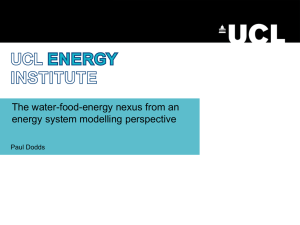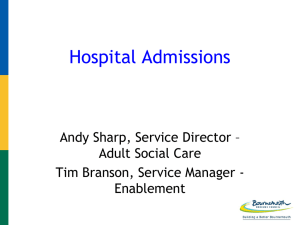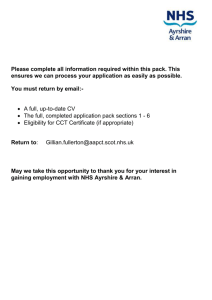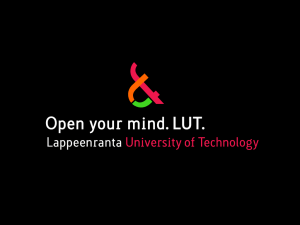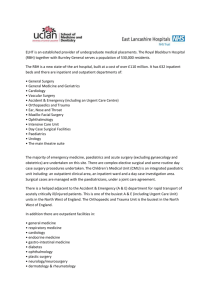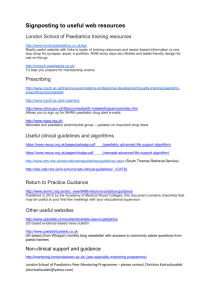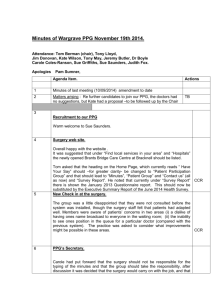Paediatrics - GPST1 Job Description - Home
advertisement
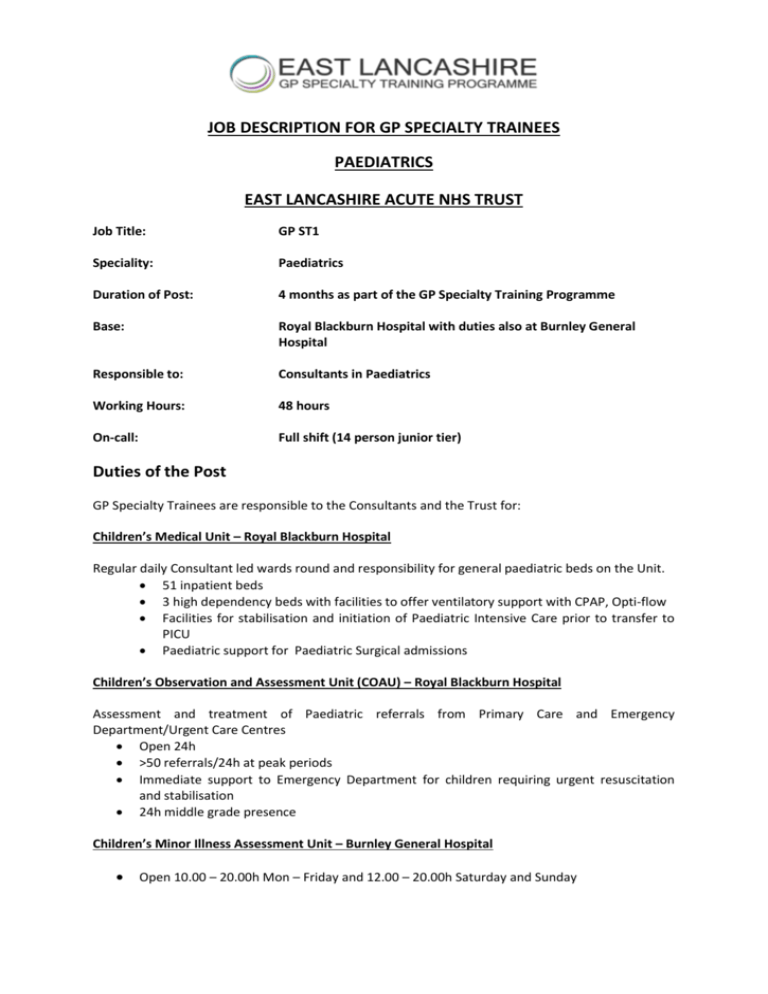
JOB DESCRIPTION FOR GP SPECIALTY TRAINEES PAEDIATRICS EAST LANCASHIRE ACUTE NHS TRUST Job Title: GP ST1 Speciality: Paediatrics Duration of Post: 4 months as part of the GP Specialty Training Programme Base: Royal Blackburn Hospital with duties also at Burnley General Hospital Responsible to: Consultants in Paediatrics Working Hours: 48 hours On-call: Full shift (14 person junior tier) Duties of the Post GP Specialty Trainees are responsible to the Consultants and the Trust for: Children’s Medical Unit – Royal Blackburn Hospital Regular daily Consultant led wards round and responsibility for general paediatric beds on the Unit. 51 inpatient beds 3 high dependency beds with facilities to offer ventilatory support with CPAP, Opti-flow Facilities for stabilisation and initiation of Paediatric Intensive Care prior to transfer to PICU Paediatric support for Paediatric Surgical admissions Children’s Observation and Assessment Unit (COAU) – Royal Blackburn Hospital Assessment and treatment of Paediatric referrals from Primary Care and Emergency Department/Urgent Care Centres Open 24h >50 referrals/24h at peak periods Immediate support to Emergency Department for children requiring urgent resuscitation and stabilisation 24h middle grade presence Children’s Minor Illness Assessment Unit – Burnley General Hospital Open 10.00 – 20.00h Mon – Friday and 12.00 – 20.00h Saturday and Sunday Duties Assessment, diagnosis and initial management of acutely ill children referred to secondary care paediatrics by primary care and Emergency Department services. To answer without unreasonable delay any request for assistance from the ED Officer or other colleagues if they wish to refer a patient for opinion. Checking Radiology and Pathology reports and ensuring that appropriate action is taken. Duties outside the Hospital that may be agreed by the Department (e.g. clinics, transfer of patients between hospitals etc). To contact personally Laboratory technicians and Radiographers on-call when they are required in cases of emergency. To interview relatives of patients, as required. Prompt and effective communication of discharge of patients to relevant professionals within the primary care team. Maintenance of adequate and proper records on patients for both clinical and audit purposes (including data input into the computer system) and for the furnishing of letters, reports and other documentation as required for medical, legal and statutory purposes. Instruction of nursing staff, FY1 and from time to time medical students, under training within the Department. Coding diagnostics and treatment of patients on the information system To attend the designated teaching sessions of the department. Clinical Governance Undertake induction and mandatory training, including completion of the Educational Agreement. In accordance with the Educational Contract, take part in audit. Teaching Manchester undergraduates are attached to the unit. The post holder is encouraged to teach them informally, and give them opportunities to clerk patients and present their histories. Educational content: The post holder will have a named clinical supervisor who is accountable for the overall educational experience of the job. The post holder will undertake a 1 week placement with their Educational Supervisor during their placement in paediatrics as well as time for an initial meeting and for the completion of Educational Supervisors reviews. The post holder will participate in a continuing programme of education in Paediatrics within the hospital department. This will be encouraged by various educational methods including self directed learning, tutorials, random case analysis, project work, audit, case studies, computer based learning and clinical practice. The post holder will be entitled to 30 days study leave in accordance with national and local guidelines. The post holder should record progress in their e-portfolio through regular learning log entries (the Deanery suggests a minimum of 3 entries per week). The Appraisal and Educational Assessment: Trainees should be appraised by their clinical supervisor at the beginning of their job, at 8 weeks and at the end of the job to provide educational feedback and suggest ways forward. Details of meetings should be recorded by the clinical supervisor in the educator notes on the trainee’s eportfolio. Educational appraisal and assessment should be based on the GP core curriculum. At the end of the post the clinical supervisor will complete the supervisors report in the trainee’s eportfolio. All available evidence relating to the post, should be reviewed before completing the report – this includes the mandatory tools, relevant ePortfolio log entries, and feedback on performance from staff and colleagues. The trainee should give feedback to the Training Programme Director on the training post. Learning Outcomes Most hospital posts which GP Specialty Trainees experience will support a number of learning outcomes derived from Being a General Practitioner as well as more specific skills and knowledge. In planning the training programme for a GP ST, clinical supervisors will want to bear in mind that the new curriculum is focused more strongly than in the past on the knowledge, skills and competences that are required in general practice. Learning Objectives for GPST Paediatric Post The following learning outcomes or objectives relate specifically to the management and care of children and young people. These learning outcomes are in addition to those detailed in the core statement, Being a General Practitioner. http://www.rcgp-curriculum.org.uk/pdf/RCGP-Curriculum-1-Being-a-GP.pdf The core statement and this statement should be used in conjunction with the other curriculum statements. In order to demonstrate the core competences in the area of care of children and young people you will require knowledge, skills and attitudes in the following areas: The learning objectives are based on the RCGP Curriculum 2010, Statement 3.04 Care of Children and Young People, revised 30 May 2012 http://www.rcgp-curriculum.org.uk/pdf/RCGP-Curriculum-3.04-Children-and-Young-People.pdf The RCGP areas of competence Area of competence Where this may be achieved during the post 1 Primary care management This area of competence is about how you manage your contact with patients, dealing competently with any and all problems that are presented to you. (This area of competence is not limited to dealing with the management of the practice.) This means that as a GP you should: 1.1 Manage and appropriately treat common and rare but important paediatric conditions encountered in primary care, such as: 1.1.1 Neonatal problems: e.g. birthmarks, feeding problems, heart murmurs, sticky eye, jaundice 1.1.2 Constipation, abdominal pain (acute and recurrent) 1.1.3 Pyrexia, febrile convulsions 1.1.4 Cough/dyspnoea, wheezing including respiratory infections, bronchiolitis 1.1.5 Otitis media 1.1.6 Sensory deficit, especially deafness 1.1.7 Gastroenteritis 1.1.8 Viral exanthems 1.1.9 Urinary tract infection 1.1.10 Meningitis 1.1.11 Epilepsy 1.1.12 Chronic disease: e.g. asthma, diabetes, arthritis, palliative conditions such as neurological disorders, and intellectual disability (see also statement 3.11 Care of People with Intellectual Disability) 1.1.13 Non-accidental injury, maltreatment and neglect 1.1.14 Mental health problems such as attention deficit hyperactivity disorder (ADHD), depression, eating disorders, substance misuse and self-harm, autistic spectrum disorder and related conditions (see also statements 3.10 Care of People with Mental Health Problems and 3.14 Care of People who Misuse Drugs and Alcohol) 1.1.15 Psychological problems: e.g. enuresis, encopresis, bullying, school refusal, behaviour problems including tantrums 1.1.16 Assessment of child and young person development (physical and psychological) 1.2 Be aware of the early presenting symptoms of childhood cancers and possible differentials, e.g. retinoblastoma, leukaemia, medulloblastoma, Wilms tumour 1.3 Appropriately manage common symptoms like vomiting, drowsiness, developmental delay, infantile colic, ‘failure to thrive’ and growth All clinical areas 1.1.6 – although trainees may have some contact with children with sensory deficits this experience could be further developed in Audiology clinics disorders, behavioural problems, obesity 1.4 Manage primary contact with children and their families – and, with older children, on their own 1.5 Demonstrate an understanding of the importance of multiagency working (working across professional and agency boundaries) and the principles of information sharing 1.6 Co-ordinate care with other primary care professionals, paediatricians and other appropriate specialists, leading to effective and appropriate care provision, taking an advocacy position for the patient or family when needed, including for palliative and end-of-life care 1.7 Safeguard children and young people, understanding that: 1.7.1 The welfare of the child and young person must be the paramount consideration3 1.7.2 In dealing with vulnerable children and young people, a focus on the family risks losing sight of the child 1.7.3 Often children and young people in special circumstances are ‘invisible’ to the system because they live in the shadow of their parents’ problems 1.7.4 Dealing effectively with maltreatment of children and young people involves recognising the clinical features, knowing about local arrangements for child protection, referring effectively and playing a part in assessment and continuing management, including prevention of further abuse 1.8 Describe the principles of child-focussed clinical governance and risk management such as safety of treatment and care, safeguarding, the use of evidence-based practice, clinical audit, effective prescribing and referrals 1.9 Ensure that parents or carers, children and young people receive information, advice and support to enable them to: 1.9.1 Manage minor illnesses themselves, using community pharmacists and triage services where appropriate 1.9.2 Access appropriate services when necessary 1.9.3 Have shared responsibility for self -care of chronic conditions and exacerbations 1.9.4 Use repeat prescribing and reviews appropriately 1.9.5 Access support groups 1.10 Prescribe and advise appropriately about the use of medicines in children and young people, being competent at: 1.10.1 Calculating drug doses 1.10.2 Understanding the risks and benefits of medicines in relation to children 1.10.3 Understanding the needs of ethnic minorities, and cultural differences in beliefs about illness and the use of medicines 1.11 Demonstrate an understanding of the welfare of the unborn baby by: 1.11.1 Being aware of the impact of parental problems including domestic violence and abuse, substance and alcohol misuse and mental health problems 1.11.2 Being able to recognise the symptoms and presentations of such problems and to make a sensitive enquiry if concerned 1.11.3 Providing information about, or referral to, local services for women who have substance and alcohol misuse problems as they are at greater risk of problem pregnancies and their care should be provided by an integrated multidisciplinary and multiagency team 1.12 Have an awareness of disease prevention, well-being and safety in children and adolescents, including in the following areas: 1.11 – some of the competencies detailed in this section would more suitably be covered during an Obstetric post or spending time in Obstetric clinics or on Obstetric wards 1.12.1 Prenatal diagnosis 1.12.2 Breastfeeding 1.12.3 Healthy diet and exercise for children and young people 1.12.4 Social and emotional well-being 1.12.5 Keeping children and young people safe, safeguarding, accident prevention 1.12.6 Immunisation 1.12.7 Avoiding smoking, avoiding the use of volatile substances and other drugs, and minimising alcohol intake 1.12.8 Reducing the risk of teenagers getting pregnant or acquiring sexually transmitted infections 1.12.6 – most of routine immunisation would take place in Primary Care, there would be limited experience available in eg hepatitis B vaccination 2 Person-centred care This area of competence is about understanding and relating to the context of your patients as individuals, and developing the ability to work in partnership with them. This means that as a GP you should: 2.1 Adopt a family-centred approach in dealing with patients, their families and their problems. This requires: 2.1.1 Effective communication and engagement (listening to and involving children and young people, and working with parents, carers and families) 2.1.2 An understanding of the importance of supporting parents and having the skills to do this, noting that the role of fathers in parenting their children and teenagers is frequently overlooked. Their contribution to their child’s development and well-being is important. All GPs should be able to support fathers and have the skills for engaging with fathers as well as mothers 2.1.3 Being aware of the child that is ‘hidden’ behind the parents’ symptoms and illnesses 2.2 Develop and apply the primary care consultation to bring about an effective doctor–patient–family relationship to enable parents or carers, children and young people to: 2.2.1 Participate in their own care-planning and delivery 2.2.2 Be routinely involved and supported in making informed decisions and choices about care, taking into account age and development, increasing autonomy with age, and the need for confidentiality balanced with the parents’ need for information 2.2.3 Achieve concordance, including active listening and shared decision-making with you as their GP 2.2.4 Receive information on medicines in a clear way that is appropriate to their understanding as children, young people and parents 2.3 Provide longitudinal continuity of care as determined by the needs of the patient and family: 2.3.1 Understanding the problems with transitions from child to adolescent, and from adolescent to adult. This applies to all children but especially the vulnerable 2.4 Support young people with a chronic disease and their parents to negotiate the process of transition All clinical areas 3 Specific problem-solving skills This area of competence is about the context-specific aspects of general practice, dealing with early and undifferentiated illness and the skills you need to tolerate uncertainty, and marginalise danger, without medicalising normality. This means that as a GP you should: 3.1 Use a decision-making process determined by the prevalence and incidence of illness in the community and the specific circumstances All clinical areas of the patient and family: 3.1.1 Being aware of normal growth and development in children and young people 3.1.2 Being aware of neonatal problems including jaundice and feeding problems, breastfeeding and nutrition 3.2 Manage conditions and problems which may present early and in an undifferentiated way, and recognise a seriously ill child (and intervene urgently when necessary) by: 3.2.1 Having a thorough understanding of normal development, and being able to recognise delayed development through childhood and adolescence 3.2.2 Recognising normal growth, and dealing with faltering growth and failure to thrive 3.2.3 Recognising children and young people who are at risk in some way, whether physically, mentally or emotionally 3.2.4 Being aware that consultations about children may be a presentation of a mother’s postnatal depression; and being aware of the effect that postnatal depression may have on her children 3.2.5 Recognising the significance of non-attending 3.2.6 Showing concern and following up when children and young people fail to attend appointments (in primary or secondary care), given that they are reliant on their parent or carer to take them to the appointment 3.2.7 Being conscious that failure to attend can be an indicator of a family’s vulnerability, potentially placing the child’s welfare in jeopardy 3.2.8 Acknowledging that failure to attend can be an indicator that services are difficult for families and young people to access or considered inappropriate, and need reviewing 4 A comprehensive approach This area of competence is about how you as a general practitioner must be able to manage co-morbidity, co-ordinating care of acute illness, chronic illness, health promotion and disease prevention in the general practice setting. This means that as a GP you should: 4.1 Manage simultaneously both acute and chronic problems in the child, young person and family by: 4.1.1 Assessing children and young people’s developmental needs in the context of their family and environmental factors including school and community, and parenting capacity 4.1.2 Understanding the key vulnerability factors for children and young people in special circumstances, such as illness in the family, and responding to their needs, including through referral and joint working 4.1.3 Recognising inequalities and ethnic diversity, and addressing them proactively 4.2 Promote health and well-being by applying health promotion and disease prevention strategies appropriately, and using them to detect problems that may already be present but have not yet been detected, by: 4.2.1 – this will mostly be met by 4.2.1 Being aware of your role as a GP in promoting and organising immunisation training in Primary Care 4.2.2 Being aware of your role as a GP in the prevention of accidents 4.3 Recognise inappropriate eating habits such as the development of anorexia nervosa, bulimia or morbid obesity and make appropriate 4.2.2 – Emergency Medicine referrals if specialist help is required training will address this 4.4 Describe the issues involved in delivering services for young people relating to access, communication, confidentiality and consent 4.5 Provide access for young people to confidential contraceptive and sexual health advice services that are tailored to meet their needs 4.5 – Primary Care training to 4.6 Recognise the importance of supporting parents who have special needs cover this area 4.7 Recognise the needs of children of parents with substance or alcohol misuse, mental health or domestic violence and abuse problems; parents who are teenagers; and parents with severe chronic or short-term conditions that affect their capacity to look after their children. Some families may need referral for multiagency assessment and support services: this may include referral to the health visitor for a comprehensive family needs assessment to understand and address the impact of the parents’ needs on the children’s health and development 5 Community orientation This area of competence is about the physical environment of your practice population, and the need to understand the interrelationship between health and social care, and the tensions that may exist between individual wants and needs and the needs of the wider community. This means that as a GP you should: 5.1 Reconcile the health needs of patients and their families, and of the community in which they live, in balance with available resources. All clinical areas This requires: 5.1.1 Understanding the legal and political context of child and adolescent care 5.1.2 Understanding the organisation of care – care pathways and local systems of care 5.1.3 Assessing needs, including the assessment framework 6 A holistic approach This area of competence is about your ability to understand and respect the values, culture, family structure and beliefs of your patients, and understand the ways in which these will affect the experience and management of illness and health. This means that as a GP you should: 6.1 Support transitions (maximising children’s achievements and opportunities, and understanding their rights and responsibilities) 6.2 Describe the impact of disability on the child, young person and their family 6.3 Promote physical health, mental health and emotional well-being by encouraging children, young people and their families to develop healthy lifestyles 6.4 Describe your role as a GP in dealing with enuresis, sleep disturbance, bullying and school refusal In terms of the other learning outcomes there are plenty of training opportunities both in the acute settings of the Children’s Observation and Assessment Unit, Children’s Minor Illness Unit and inpatient setting of the Children’s Unit. The many General and Sub-specialty clinics available again provide extensive training opportunities in many different areas. Now Neonatology is located in Burnley trainees are encouraged to take the opportunity, when based in Burnley, to attend the Post-natal check rounds with their neonatal colleagues to obtain competencies required in Examination of the Newborn. Template work pattern Wk 9 Zero Hours 10 B: RBH Twilight 13:00 22:00 Tue A: RBH - Long 09:00 21:30 Stnd Day 09:00 17:00 Stnd Day 09:00 17:00 Stnd Day 09:00 17:00 Stnd Day 09:00 17:00 C: RBH - Nights 21:00 10:00 Stnd Day 09:00 17:00 Stnd Day 09:00 17:00 Stnd Day 09:00 17:00 B: RBH Twilight 13:00 22:00 11 Zero Hours Zero Hours D: BGH 10:00 20:00 Stnd Day 09:00 17:00 Stnd Day 09:00 17:00 D: BGH 10:00 20:00 Stnd Day 09:00 17:00 Stnd Day 09:00 17:00 1 2 3 4 5 6 7 8 12 13 14 Mon A: RBH - Long 09:00 21:30 Stnd Day 09:00 17:00 Stnd Day 09:00 17:00 Stnd Day 09:00 17:00 Stnd Day 09:00 17:00 C: RBH - Nights 21:00 10:00 Stnd Day 09:00 17:00 Stnd Day 09:00 17:00 Wed A: RBH - Long 09:00 21:30 Stnd Day 09:00 17:00 Stnd Day 09:00 17:00 Stnd Day 09:00 17:00 Stnd Day 09:00 17:00 C: RBH - Nights 21:00 10:00 Stnd Day 09:00 17:00 Stnd Day 09:00 17:00 Stnd Day 09:00 17:00 B: RBH Twilight 13:00 22:00 Stnd Day 09:00 17:00 D: BGH 10:00 20:00 Stnd Day 09:00 17:00 Stnd Day 09:00 17:00 Thu A: RBH - Long 09:00 21:30 Stnd Day 09:00 17:00 Stnd Day 09:00 17:00 Zero Hours Stnd Day 09:00 17:00 C: RBH - Nights 21:00 10:00 Stnd Day 09:00 17:00 Stnd Day 09:00 17:00 Stnd Day 09:00 17:00 B: RBH Twilight 13:00 22:00 Stnd Day 09:00 17:00 D: BGH 10:00 20:00 Stnd Day 09:00 17:00 Stnd Day 09:00 17:00 Fri Sat Sun A: RBH - Long 09:00 21:30 A: RBH - Long 09:00 21:30 C: RBH - Nights 21:00 10:00 C: RBH - Nights 21:00 10:00 B: RBH Twilight 13:00 22:00 B: RBH Twilight 13:00 22:00 Zero Hours Stnd Day 09:00 17:00 Stnd Day 09:00 17:00 A: RBH - Long 09:00 21:30 Stnd Day 09:00 17:00 Zero Hours Stnd Day 09:00 17:00 C: RBH - Nights 21:00 10:00 Stnd Day 09:00 17:00 B: RBH Twilight 13:00 22:00 Stnd Day 09:00 17:00 F: BGH Friday 10:00 19:00 Stnd Day 09:00 17:00 Stnd Day 09:00 17:00

